It would be perfectly understandable if Mark Tremonti woke up some mornings asking himself, “What band am I in today?” In addition to his two-decade stint as a member of the multi-platinum outfit Creed, the guitar virtuoso leads a double (or is it triple?) life with the successful four-piece Alter Bridge and the recent solo project that bears his surname, Tremonti.
“It can be a bit of a juggling act, but it’s not as crazy as you might think,” Tremonti says with a laugh. “I just have to do a lot of planning ahead, but that’s okay because I like to keep busy. No matter what band I’m working with at any given time, I’m always in songwriting mode, and that makes everything easier for me. Sometimes when you shut it off for a few months, it’s hard to get it back. I’m always firing on all cylinders when it comes to keeping the imagination going.”
Tremonti’s restless nature was the impetus for his latest venture. Back in 2011, Alter Bridge singer and guitarist Myles Kennedy was booked for a three-month tour fronting Slash’s band (later rechristened Slash featuring Myles Kennedy and the Conspirators), so Tremonti, flush with songs, rounded up rhythm guitarist Eric Friedman, drummer Garrett Whitlock, and longtime producing pal Michael “Elvis” Baskette to cut All I Was. The album marks Tremonti’s debut as a lead vocalist.
The bass slot in Tremonti’s band has been a bit of a sticking point until recently. For those keeping score at home, it goes something like this: Friedman played bass on All I Was, and Creed/Alter Bridge bassist Brian Marshall performed with the group briefly on tour. When Marshall had to bow out, Tremonti’s good friend Wolfgang Van Halen replaced him, becoming a full-fledged band member in 2013.
Van Halen plays bass on Tremonti’s just-released follow-up, the altogether robust Cauterize, as well as on the upcoming Dust, due later this year. But as it goes with this gang of multitasking musicians, Van Halen had to forgo touring with Tremonti to hit the road with that arena-filling group his father leads. Tanner Keegan is filling in as Tremonti’s live bassist.
“It was definitely a bummer when we found out that Wolfgang couldn’t tour with us,” Tremonti says, “but we always knew that might come up. Van Halen is, obviously, his priority, and we understand that. There will be other opportunities down the line to have him play live with us, and we can’t wait for that to happen.”
We spoke with Tremonti about his two new albums, working with Wolfgang, his foray into fingerpicking, and whether Creed will ever return to action.
The first album was you, Eric, and Garrett, with Eric overdubbing bass. Did it feel more like a band this time with you, Eric, Garrett, and Wolfgang?
Absolutely. Having all of us together makes a big difference, especially when you’re piecing song ideas together with all the guys playing at the same time. When you don’t hear that bass guitar filling those frequency ranges, you don’t feel that low end and you’re just hoping for the best in the end. This time, we heard that low end right away, and I think it helped the songs, the vibe, everything.
Wolfie really locks in great with Garrett. This music is quite different from what he plays
in Van Halen. Did it take him a while to get used to working with another drummer?
No, not at all. He’s a master at what he does. He just comes in and owns it. He’s a very gifted musician, and it only takes him moments to get a grasp of riffs and ideas. He’s definitely one of the best bass players I’ve encountered.
What’s it like knowing that, because of Wolfgang, Eddie Van Halen is going to hear your guitar playing?
I don’t really think about that too much. We’re just buds hanging out and being excited about our music. Sure, it’s awesome knowing that Eddie Van Helen is eventually going to hear your records, but it’s not something we’re constantly talking about. When Wolfgang is around, he’s just Wolfgang. We don’t really think of the Van Halen thing because we’re not around it. The only time that happens is when we play L.A., and his dad comes to a show. Then it’s like, “Oh, man…” and you remember, “This is Eddie Van Halen.”
Are there still things that you can’t do on guitar, but want to?
Oh, absolutely. I’m always trying to challenge myself and learn new things, so when the next record comes out I’m not just repeating myself. On the last few records I tried not to do some of my favorite lead tricks, just because I’ve done them before. I need to come up with new ideas, techniques, tunings, and just new ways to express myself. Working with alternate tunings has been my creative savior. Whenever I hit a wall, I just find a new tuning, and suddenly I’ve got a whole new world of possibilities.
The newest member of Tremonti is Wolfgang Van Halen, who played on both Cauterize and Dust. “He’s definitely one of the best bass players I’ve encountered,” says Tremonti.
What kinds of lead tricks were you trying not to repeat?
There are certain patterns I love and gravitate toward. If I’ve done them three or four times in my career, I try to be aware of that and change things up. I always want to come up with something that pushes me in another direction.
Is it ever awkward working with Brian Marshall? He was in Tremonti originally and left the band, yet you still play together in Alter Bridge.
No, not at all, because he never was really in Tremonti—he was just filling in on the live side. He didn’t play on the record, and I think he only played three or four dates with us.He had the opportunity to be in the band, but he had personal stuff going on and had to step out to deal with some things. We had to find a replacement, and that’s how we got Wolfgang.
You wrote 25 songs for Cauterize. When did you know it would yield another record?
Not until a little later. I talked with Elvis, and I said, “I’ve got a ton of material I want to get out. Let’s make the most of your time.” We decided to do 20 of the 25 songs I wrote—we narrowed them down in preproduction. Then we went ahead and recorded everything, not knowing how we’d release it all. When it came down to almost the mixing stage, I looked at the whole package and decided, “I grew up with records that had eight songs on them. That’s how I see this.”
Records with eight or 10 songs are very digestible. When I was a kid, that’s how many songs were on records, and they’re some of my favorite albums ever. They never seemed short. Now when bands put out 15 or 16 songs on records, I get lost—it’s too much stuff.
Doing two shorter records with as many dynamics as possible feels right to me. There are slower songs, heavier songs—both albums have pretty similar flows. I’m glad I split them up because I want people to be hungry for the next record. I want them to know this record inside and out before the next one comes out. If it was a really long record, they might have too much to sift through.
What’s the ratio of riffs you keep to ones you ditch?
The older I get, the looser I get with just erasing ideas. Back in the day, I used to horde ideas. If something was decent, I’d keep it. Nowadays I go through what I have, and if something doesn’t excite me, I immediately get rid of it. [Pause.] Well, not always. If something’s decent, I’ll let it live for a little bit before I erase it. I let it give me a few opportunities to impress me or just to bore me.
A lot of times I write and don’t look back at what I’ve done for a good month or so. That way something will be completely fresh—I’ll have that first impression again. So yeah, things can float to the top of the pile like that sometimes.
Mark Tremonti's Gear
Guitars
PRS Mark Tremonti Signature Model, SE, SE Custom Mark Tremonti Signature Model
Amps
Mesa/Boogie Triple Rectifier
Bogner Uberschall
PRS Archon
Cornford RK100
Van Weelden Twinkleland
Effects
Morley Mark Tremonti Wah
Ibanez TS 808HW Tube Screamer
T-Rex Mark Tremonti Phase Shifter
Dunlop Uni-Vibe
T-Rex Octavius
Voodoo Lab Pedal Power 2 Plu
Voodoo Lab Ground Control and GCX Switcher
Radial Tonebone
Strings and Picks
D’Addario strings (bottom three strings from an .011 set, top three from a .010 set)
Dunlop 1 mm nylon picks
How do you and Eric divvy up guitar parts in the studio?
I just have my parts and I play them. Then Eric puts whatever he wants on top of them. In this band, I’m not some dictator telling everybody how to play their parts. I just come up with the original ideas. Whatever anybody puts on it is up to them, unless it’s completely distracting, which never happens. Everybody’s so talented in this band— that’s why I partnered up with them.
What were your main guitars on Cauterize?
My signature model—that’s all I used. For this album, my brother called PRS and got them to send us 12 guitars, and we tracked 12 of the
songs with those individual guitars. Those are the guitars that fans were able to get. Twelve of the songs we tracked with different signature models.
Now, which signature model are we talking here? You have more than one.
Yeah, I have three versions. There’s an SE, SE Custom, and the American-made signature model, which I used on the record. The other guitars are made in Korea.
What about the other eight songs you recorded?
I just picked my favorite two guitars. I have a charcoal-burst single-cut, which is my absolute favorite PRS. I use that on anything tuned a half step down or in standard tuning. Anything below that, I would use one of my six single-cuts.
What amps did you use?
I brought in my Mesa/Boogie Rectifier, my Bogner Uberschall, my Cornford RK100, and the PRS Archon for all the lead and rhythm stuff. Depending on the sound, we’d mix and match amps. For some of the cleaner or half-dirty stuff, I used the Van Weelden Twinkleland. I brought in a ton of amps, but those are the ones that made the cut.
What about effects?
We’re fans of the [Electro-Harmonix] Micro Synth. That thing has definitely showed its face on a lot of Alter Bridge and Tremonti records. There’s this Foxx overdrive that Elvis loves—we use that. Of course, I use a [signature] Morley Power Wah. But in both Tremonti and Alter Bridge, it’s Miles or Eric who really run with the effects to make all the atmospheric stuff on top of the rhythms. I’m more of a straightforward kind of guy—my tone is very direct and dry. I don’t really like anything other than just a slight delay on my stuff. Every now and then if I’m feeling moody, I’ll put a Uni-Vibe on. I like the T-Rex Octavius pedal, too, but I hardly ever use it.
Tremonti is releasing two albums this year and planning one with his other band, Alter Bridge, for 2016. As for Creed? “You never say never,” says the guitarist. Photo by Atlas Icons / Steve Legato.
Let’s talk about some of the songs on Cauterize. On “Arm Yourself,” the solo is very languid, and you play some country-sounding double-stop bends.
I like the opportunity to do a solo that’s a little untypical of me. Playing a fingerstyle thing made it different from the rest of the album. I like giving myself a challenge like that. I’ve been getting into fingerstyle stuff recently. Actually, my fingers are killing me today, because I went full blast at it the other night on an acoustic guitar. It just about tore up my three fingers because they’re not used to it. Maybe there will be more fingerstyle on the next record. Who knows?
“Dark Trip” is a very somber song, but you offset the overall sound with a screaming solo.
I’m glad you pointed that one out. The “Dark Trip” solo could be one of my favorites on both the records. It was one I wanted to put a ton of emotion into. It’s not too much flash, but it’s got just the right amount of notes. I wanted it to be powerful, but also something that would just sing.
“Fall Again” is a strange track—in a good way. Did you always have that ominous reverse delay intro and outro?
I did, yeah. When Creed was breaking up and I was putting Alter Bridge together, I bought a studio and took some engineering courses. I bought a Pro Tools rig and recorded about 10 songs. “Fall Again” was one of them. That intro was me doing volume swells with my guitar. I found this really great preset on a plugin called Atmosphere—it sounds incredible—so I used that for the intro and outro. Actually, what you hear is from a demo I did in 2001 or 2002. We tried to recreate it, but the original demo sounded great, so we just kept it.
it’s too much stuff.”
In the outro to the song “Cauterize,” you play a delicate fingerstyle version of the chorus. Is that how you first came up with the song?
That was actually the whole origin of the song. I was playing that part and really liked the melody, so I started singing over it, and I thought it was a great chorus. The fingerpicked part got kicked to the curb, but I didn’t want to let it go to waste, so I brought it back for the outro. I play that kind of thing at home. I sit down to write and I float around on some fingerstyle stuff, and before I know it a melody comes out, which I have to chase down. I get a lot of ideas that way.
You’ve worked with Elvis for quite a while. How does he push you creatively?
I just trust him. I know that when the album’s done, it’s going to sound amazing, and it’ll be the best it can be. In preproduction, he becomes the fifth band member in terms of arrangements and transitions. When we put together the 25 songs I wrote for these records, we worked up arrangements as quickly as possible, knowing that we were going to go back in and tear the arrangements apart during pre-production. Elvis becomes another crucial decision-maker in things like, “Hey, how can we make this transition better?” He’s just great with the flow of songs.
But do you ever lock horns? Sometimes a strong dissenting opinion can be a good kick in the pants.
We rarely butt heads like that. The only disagreement we had on this record was when he said that “Arm Yourself” was his least-favorite song, which took us all by surprise. We were all like, “Wow, that’s one of our favorites.” It’s probably the heaviest song on the record. By the time we recorded it and it was time for me to do vocals, he was like, “You know, this is a really fun song.” I was like, “See? I told you.”
YouTube It
This live clip gives a up-close look at Mark Tremonti annihilating his fretboard on the title track to his new album, “Cauterize,” including a cool fingerpicked outro.
First impressions are always tough. That’s the toughest thing about being a producer: Bands have lived with stuff for months or years, and you’re just hearing their material for the first time. Not everything is an instant listen. With “Arm Yourself,” I think that song just took him a minute to figure out.
Are there any plans to do a Creed record or tour? Obviously, Scott Stapp has had some issues recently …
We don’t have any plans right now. I’ve got so much going on at the moment that I’m happy with, so it’d be tough to fit in anything else right now. But you never say never. We just haven’t had anybody approach us and say, “These people want you for a tour,” or “So-and-so is interested in a record.” And like I said, I’ve got two records that have to come out this year, and I’ve got an Alter Bridge record next year. My plate’s pretty full at the moment. It’s all good. PG



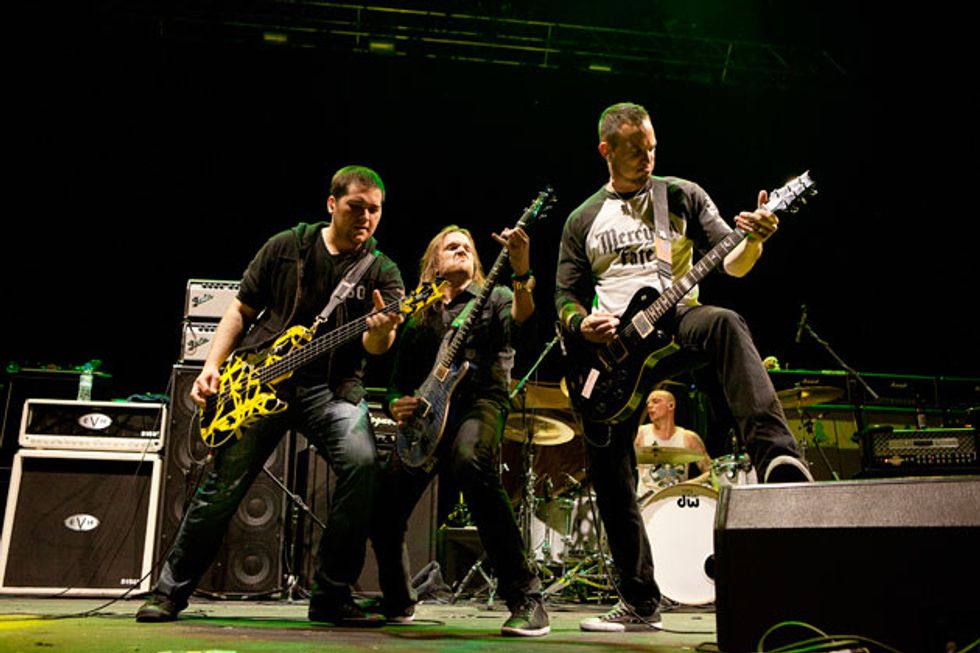
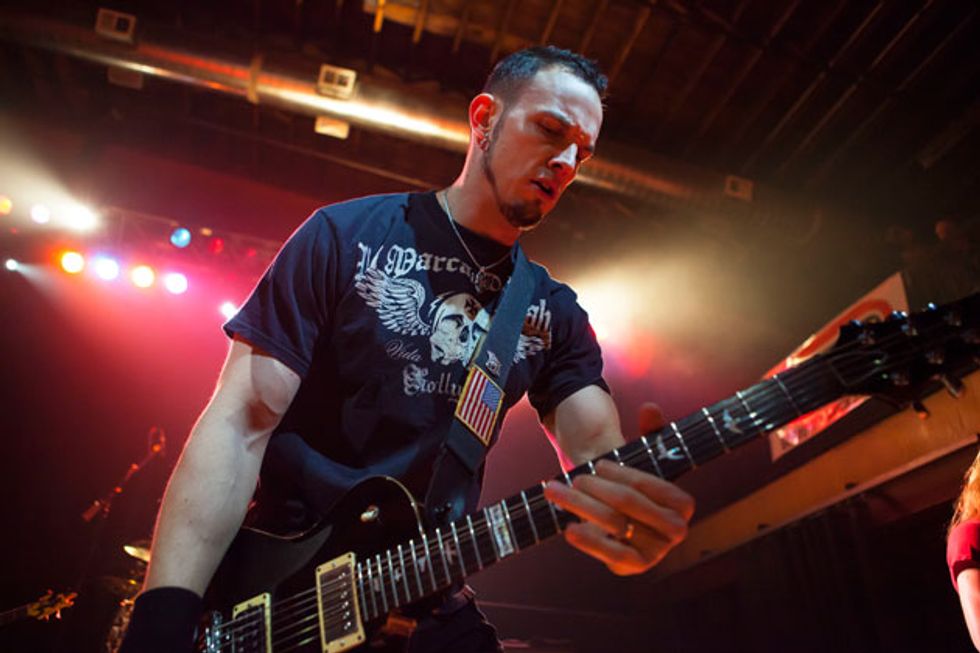






![Rig Rundown: Russian Circles’ Mike Sullivan [2025]](https://www.premierguitar.com/media-library/youtube.jpg?id=62303631&width=1245&height=700&quality=70&coordinates=0%2C0%2C0%2C0)
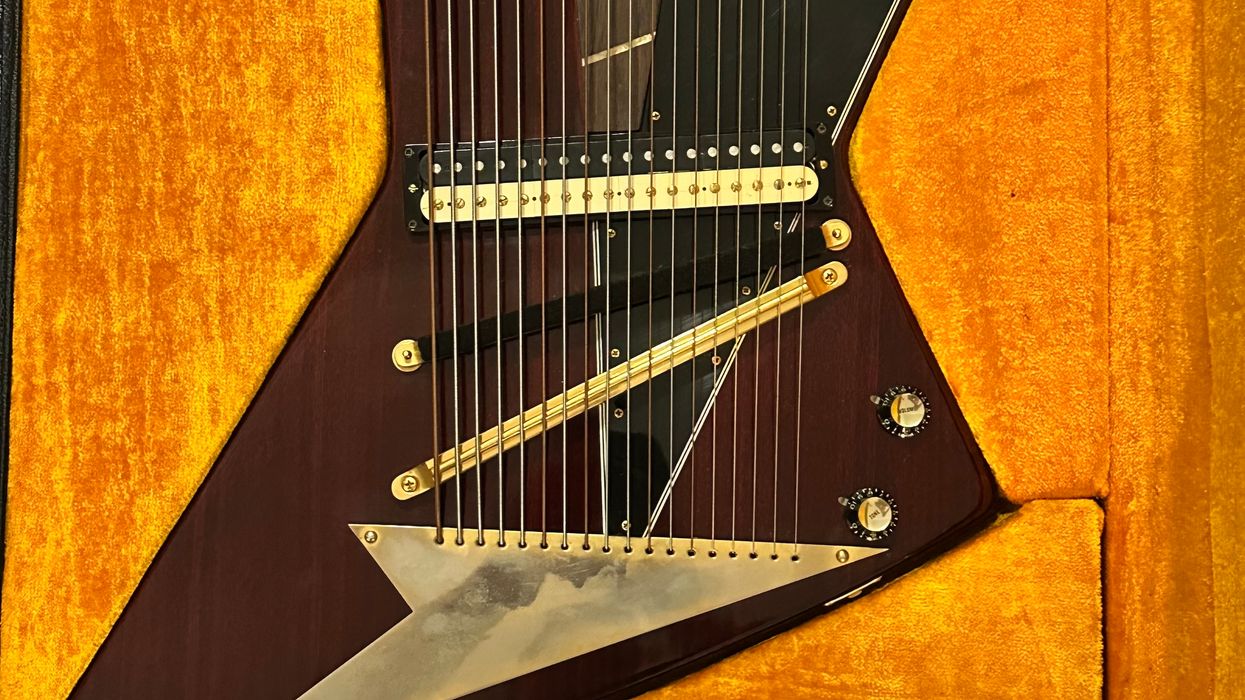
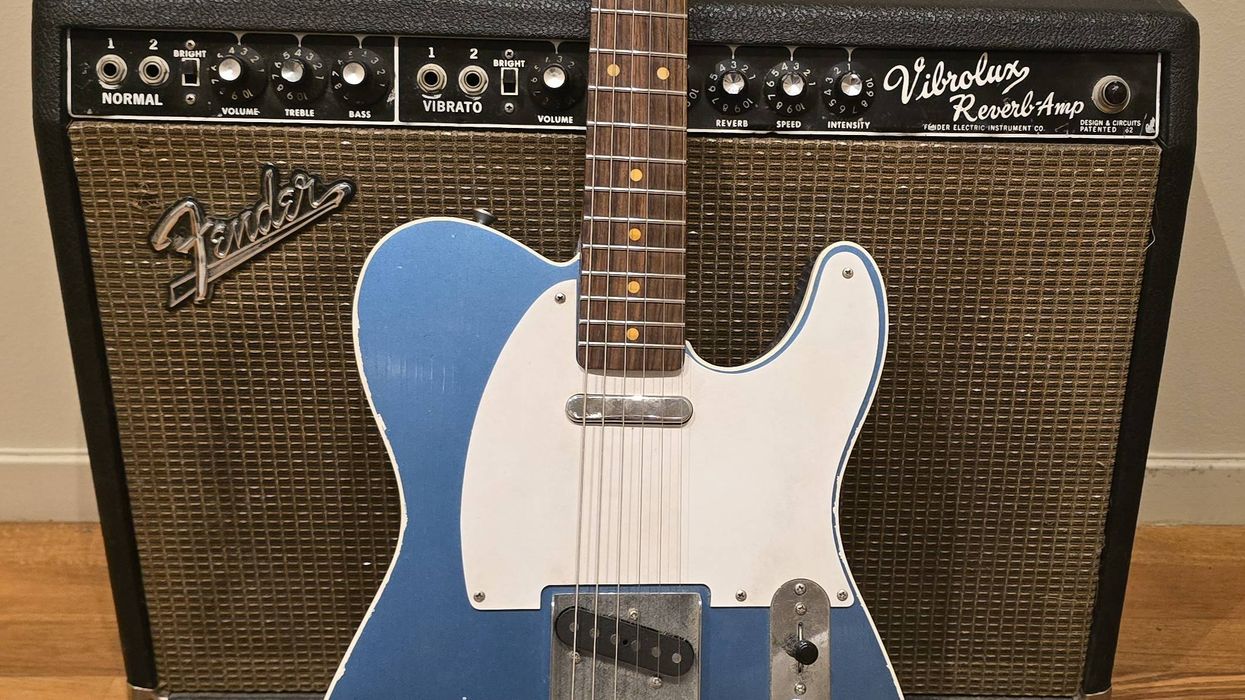
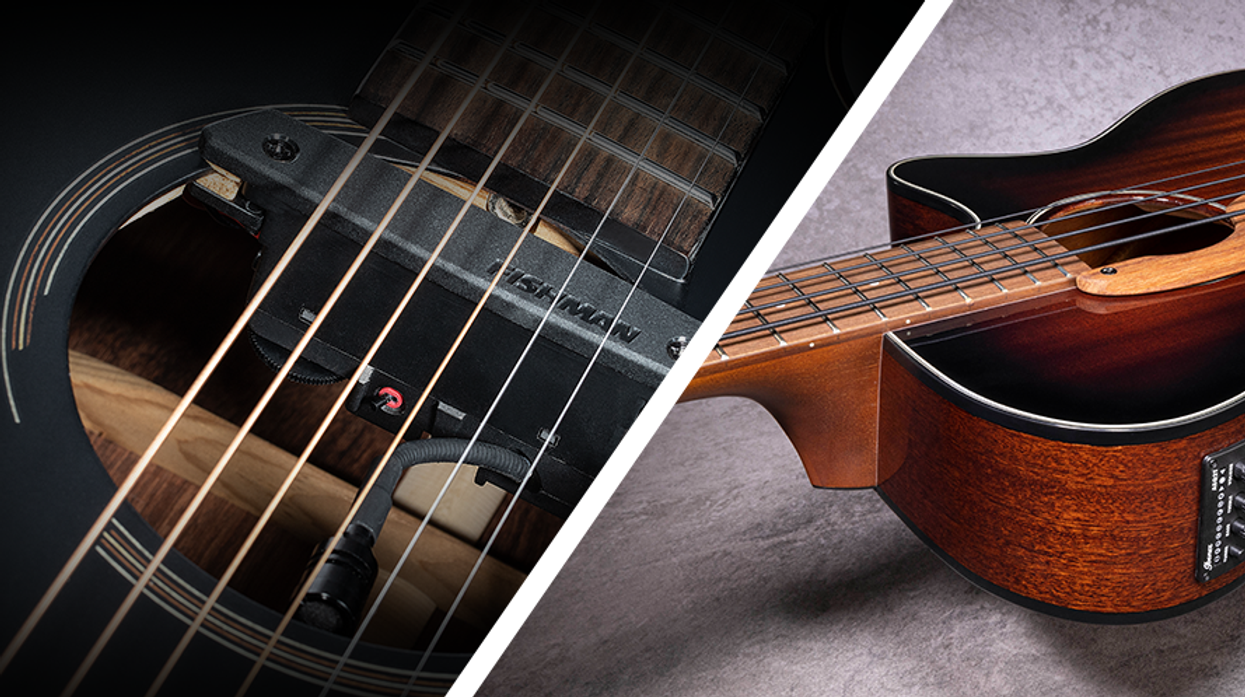
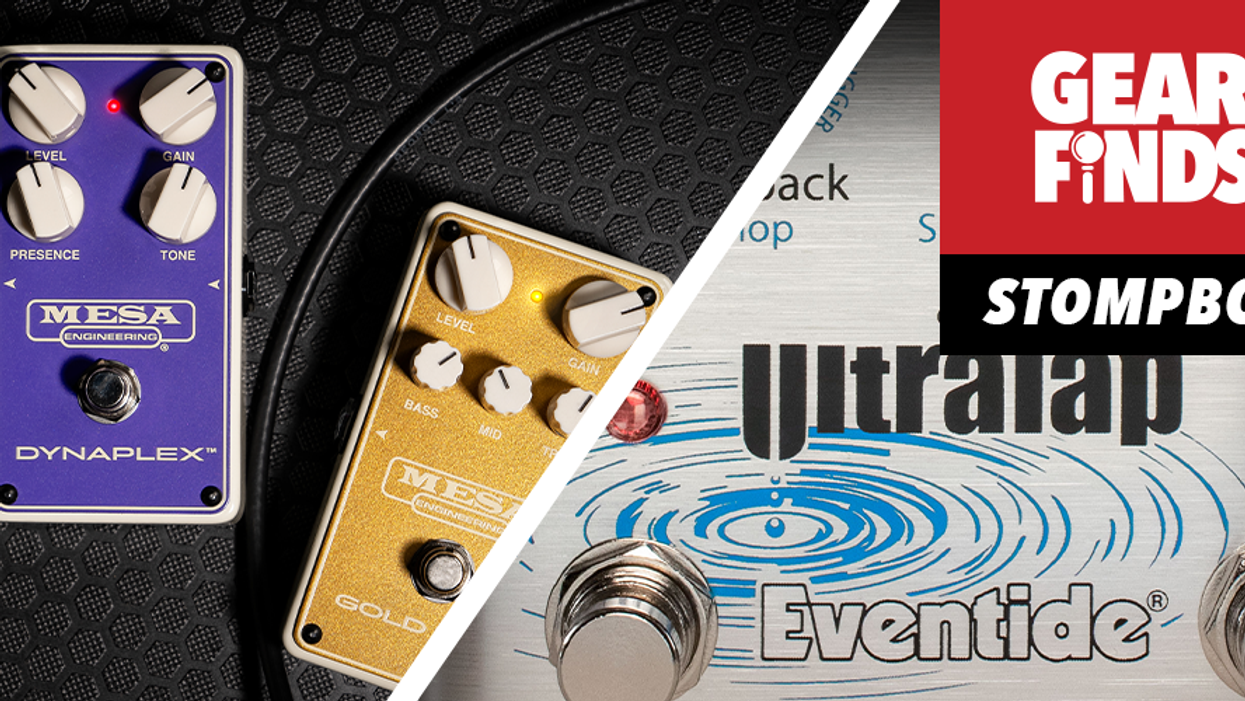










![Rig Rundown: AFI [2025]](https://www.premierguitar.com/media-library/youtube.jpg?id=62064741&width=1245&height=700&quality=70&coordinates=0%2C0%2C0%2C0)




















 Zach loves his Sovtek Mig 60 head, which he plays through a cab he built himself at a pipe-organ shop in Denver. Every glue joint is lined with thin leather for maximum air tightness, and it’s stocked with Celestion G12M Greenback speakers.
Zach loves his Sovtek Mig 60 head, which he plays through a cab he built himself at a pipe-organ shop in Denver. Every glue joint is lined with thin leather for maximum air tightness, and it’s stocked with Celestion G12M Greenback speakers.











